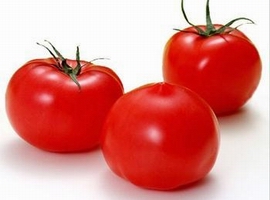 matoes, said to be the world’s most popular fruit, can be made both better-tasting and longer-lasting thanks to UK research with purple GM varieties.
matoes, said to be the world’s most popular fruit, can be made both better-tasting and longer-lasting thanks to UK research with purple GM varieties.“Working with GM tomatoes that are different to normal fruit only by the addition of a specific compound, allows us to pinpoint exactly how to breed in valuable traits,” said Professor Cathie Martin from the John Innes Centre.
The research could also lead to GM varieties with better flavor, health and shelf life characteristics because even higher levels of the compounds can be achieved.
In research to be published in Current Biology, Martin and colleagues studied tomatoes enriched in anthocyanin, a natural pigment that confers high antioxidant capacity. The purple GM tomatoes have already been found to prolong the lives of cancer-prone mice and in the latest findings they also more double the normal shelf life of tomatoes from an average of 21 days to 48 days.
“Post-harvest losses due to rotting are such a serious problem for growers and supermarkets that even an increased shelf life of one day would make an enormous difference to them,” said Yang Zhang, lead author from the John Innes Centre.
One way to improve shelf life is to pick tomatoes early when they are still green and induce them to ripen artificially with ethylene. However, this results in loss of flavor. Another method is to grow varieties that never fully ripen, but these also never develop a full flavor.
In the current study, anthocyanins were found to slow down the over-ripening process that leads to rotting and softening, achieving a tomato with a long shelf life and full flavor. The purple tomatoes were also less susceptible to one of the most important postharvest diseases, grey mould caused by Botrytis cinerea.
Conventional tomatoes can now be screened for their antioxidant capacity. Those found to be highest in antioxidant compounds can be used as parental lines for breeding.
“Our research has identified a new target for breeders to produce tomato varieties that are fuller in flavor, and so more appealing to consumers, and more valuable commercially due to increased shelf life,” said Martin.
The findings could also be applied to other soft fruit such as strawberries and raspberries.
Other varieties of JIC tomatoes high in a variety of compounds such as those found in red wine are being used by Essex company Biodeb to develop a range of skincare products.
The research was supported by EU projects FLORA and ATHENA, a Rotation Studentship from the John Innes Foundation to Yang Zang, the core strategic grant to the John Innes Centre from the BBSRC, an EMBO fellowship, the Fundacion Genoma and the Spanish Ministry of Science and Education.
Reference: “Anthocyanins double the shelf life of tomatoes by delaying over-ripening and reducing susceptibility to grey mould” by Yang Zhang et al.





